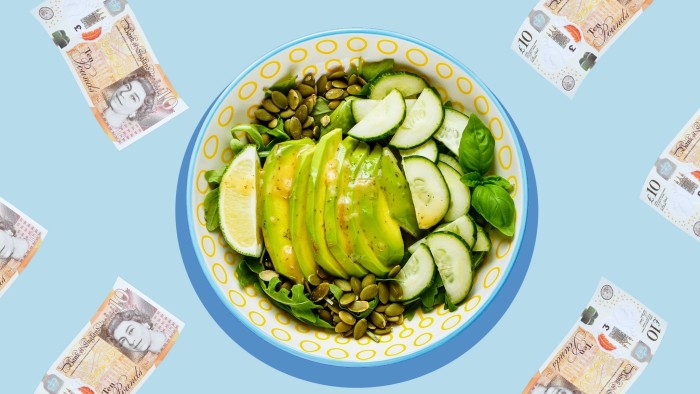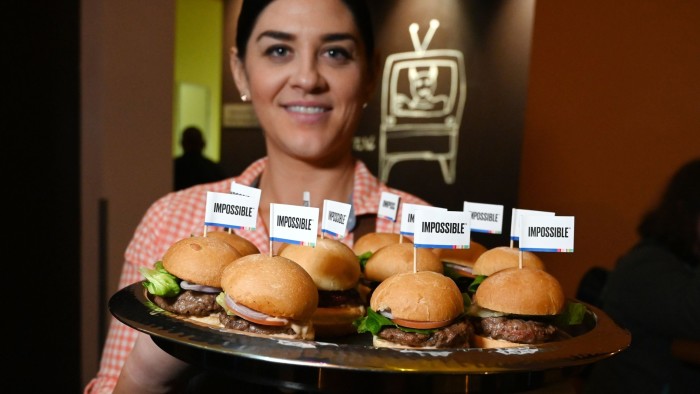Veganuary: will you end up broke by eating ‘woke’?


Roula Khalaf, Editor of the FT, selects her favourite stories in this weekly newsletter.
For his homecoming dinner at Christmas, I asked my stepson which of his favourites he fancied. Roast beef with all the trimmings? Homemade lasagne? Or how about his dad’s Scottish speciality, mince and tatties?
The answer was none of the above.
He now works for a renewable energy company in Exeter, and all areas of his life are turning green.
“From a climate change perspective, beef is the absolute worst source of protein,” he messaged back. I almost dropped my phone.
Later, he sent me a link to the BBC’s Climate Change Food Calculator. Beef is classified as having the highest carbon impact, averaging nearly 15kg of greenhouse gas emissions per serving due to the vast amount of resources needed to raise cattle. By contrast, tofu produces less than 1kg.
Cutting out meat and dairy products could reduce a person’s personal carbon footprint by two-thirds, according to an Oxford university study.
I had heard these arguments before — plus the ones about animal cruelty — but somehow, the facts assumed a greater significance when relayed to me by our son and heir.
Not that he has given up meat and dairy completely. But the concept of “flexitarianism” — consciously eating a more plant-based diet, with the occasional slab of sustainably-sourced meat — is gaining traction.
Around one-third of Britons now take a “flexitarian” approach to eating, according to research from Mintel, with 34 per cent of meat eaters saying they had reduced their meat consumption in the six months to July 2018.
Young people are driving the trend. Mintel reports that one in five millennials has “tried to adopt a vegan diet” and predicts that UK sales of meat-free foods — including a growing range of vegan products — will break the £1bn barrier by 2023.
According to some surveys, there are now 3.5m vegans in the UK alone.
The trend is also being noted by investors. The first vegan exchange-traded fund, from Beyond Advisors, is set to launch in the US this month — and UK stock market listed companies are all jumping on the plant-based bandwagon for Veganuary (if you thought dry January was hard, then try giving up meat and dairy products too).
Greggs was said to have “won Twitter” last week when its #vegansausageroll social media campaign went viral after Piers Morgan let it be known that he found the product’s existence unpalatable. I tried to buy one this week, but every Greggs in London had sold out. “The bakery can’t keep up with demand!” my local store said.
M&S got into hot water last year with its overpriced and over packaged cauliflower steaks. This month’s launch of its Plant Kitchen vegan range — which includes cauliflower popcorn (yum) and dirty vegan fries (yuck) — left the retailer with egg on its face after several products were found to be labelled “not suitable for milk or egg allergy sufferers”.
Changing our dietary habits may be better for the planet and our bodies, but what about our wallets? I already buy (mostly) organic meat, milk, eggs and fruit and veg. You can end up broke by eating “woke”.
Before FT-reading vegans humanely take me apart in the comments section, I am aware that lentils and chickpeas cost pennies per portion. But I’d argue that the biggest cost of a vegan diet is the time it takes to prepare and cook fresh food.
One way around this is to pay a vegan chef to cater for your dinner party. At possibly the most east London gathering I have ever been invited to, a close friend did this for her birthday recently. I arrived at her house mid-afternoon, to find the wonderfully named chef Tegan the Vegan furiously whisking chickpea water to create an egg-free meringue.
The silken tofu for the vegan fish and chips had been marinating overnight in lemon juice; vegan beer was used in the batter, and there was a whole lot of veg prep going on. But the end result was joyous.
Between delicious mouthfuls, we all kept saying: “I can’t believe this is actually vegan food!”
What I really love is the brandnames. Take Sheese, a Scottish made brand of surprisingly good vegan cheese. And I utterly love Mylk, a plant-based milk alternative from Rebel Kitchen, which contains coconut cream, and oat milk — now my go-to choice for making porridge.
Going vegan . . .

20%
Percentage of millennials who have tried to adopt a vegan diet
34%
Percentage of meat eaters who reduced their meat consumption in the six months to July 2018
£1.1bn
Sales in the meat-free market are forecast to increase by a further 44% by 2023
Source: Mintel
As for vegan “junk food” . . . the Greggs sausage roll may have eluded me, but this week I tried vegan fried “chick’n” at the famous Hackney takeaway, the Temple of Seitan. The queues are legendary, and the meal deal set me back £11, but my goodness it knocked spots off anything from KFC. In a twist of delicious irony, it is next door to the Hackney Meat Centre.
I have found it easy and fun to make changes, and would urge others to try. Meanwhile, Caroline Lucas the Green Party MP has provided some serious food for thought by calling for a “meat tax” to force people to consume less, and face up to the environmental and health consequences of their diets.
While I’m not prepared to give up meat and dairy completely, I am choosing to eat them less frequently. During January, whenever I eat out or buy lunches or takeaways, I am picking the vegan option — nowadays, there is usually more than one choice.
I am also keen to make some green adjustments to my investment portfolio this year. Moira O’Neill at Interactive Investor notes that it’s currently much easier to go vegan in a restaurant or supermarket than to go green in the funds market.
This is partly a labelling issue — ethical, sustainable, ESG, and SRI are among the myriad definitions that the investment industry is grappling to classify — and strategies also vary, from screening out “sin stocks” versus investing in companies deemed to be doing good.
However, I feel confident that the menu of options will widen as 2019 progresses. But I will return to the subject of veganism — and green investing — after I have digested more of the evidence.
Claer Barrett is the editor of FT Money, and presents a daily financial news bulletin on Eddie Mair’s LBC drive-time show at 5.30pm: claer.barrett@ft.com; Twitter @Claerb; Instagram @Claerb
Comments